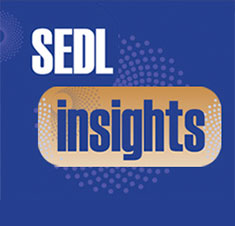SEDL Insights Archive
SEDL Insights was a quarterly publication based on the experience, expertise, and research of SEDL staff. It was designed to give educators practical suggestions for implementing school improvement strategies.
Teaching Content-Area Literacy and Disciplinary Literacy
Vol. 3, No. 1 (Spring 2015)
To graduate high school fully prepared for college and the workforce, students need more than basic literacy skills. They need to master the distinct approaches to literacy that are used in academic disciplines such as science, mathematics, and history––as well as Career Technical Education courses. This issue of SEDL Insightsfocuses on two types of literacy that are crucial to helping students become college and career ready: content-area literacy and disciplinary literacy.
Implementing Effective Professional Learning Communities
Vol. 2, No. 3 (Winter 2014)
Professional learning communities—or PLCs—can offer a learning-focused process that improves teaching and learning. To make a difference in student achievement, PLCs must be more than teacher gatherings. This issue of SEDL Insights explores ways that education leaders can guide their staff in the implementation of effective PLCs
How Districts Can Lay the Groundwork for Lasting Family Engagement
Vol. 2, No. 2 (Summer 2014)
Family engagement in a student’s education can lead to improved student academic achievement, attendance, and behavior. Yet many districts and schools still struggle to form strong partnerships with the families they serve. Having a supportive district-level infrastructure is key to the success and sustainability of family engagement initiatives. This issue of SEDL Insights outlines district supports that can lay the foundation for high-impact family engagement.
Building Supportive Relationships in Afterschool
Vol. 2, No. 1 (Spring 2014)
Afterschool programs can help students develop knowledge to enhance academic success while also providing them with opportunities to develop social and problem-solving skills. In our work with afterschool programs, we have seen that positive relationships with school-day personnel, families, community members, and between and among program staff and students help these programs thrive. This issue of SEDL Insights explores how afterschool practitioners can build strong relationships that benefit all stakeholders.
Teaching Mathematics Conceptually
Vol. 1, No. 4 (Winter 2014)
Mathematics instruction in the United States has historically focused on procedures, facts, and algorithms. Because of that focus, mathematics instruction, in essence, becomes lessons in arithmetic and efficiency. While there are promising changes occurring in mathematics instruction, we still need to help both teachers and students develop a more conceptual understanding of mathematics. This issue of SEDL Insights helps educators shift from helping students memorize rules to facilitating a deeper understanding of mathematics concepts.
Increasing the Effectiveness of Literacy Coaches
Vol. 1, No. 3 (Fall 2013)
Literacy coaches provide teachers from all content areas with the support and professional development they need to deliver high-quality literacy instruction to all students. This issue of SEDL Insights how education leaders can help literacy coaches have the greatest impact at their schools.
Managing the Implementation of School
Improvement Efforts
Vol. 1, No. 2 (Summer 2013)
For a school improvement initiative to succeed, education leaders must do more than adopt a new
program and train staff. This issue of SEDL Insights explores steps that leaders can take to ensure
the successful implementation of a new program or practice.
Leadership Actions for Transforming Schools
Vol. 1, No. 1 (Spring 2013)
This inaugural issue of SEDL Insights reviews actions that school leaders can take to more effectively guide the school transformation process.
Questions or comments should be directed to:
Laura Shankland
AIR
4700 Mueller Blvd.
Austin, TX 78723
Phone: 512-391-6556
Fax: 512-476-2286
Email: lshankland@air.org

